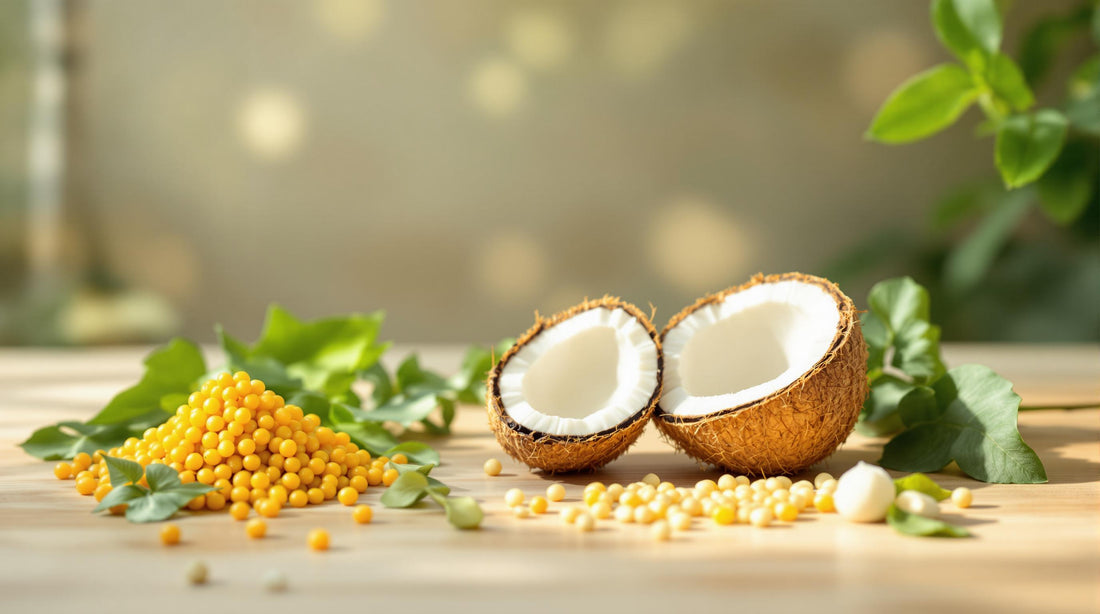
Ayurvedic Diet for Hair Growth: Seasonal Superfoods Explained
Want healthier, stronger hair? Ayurveda links hair health to your overall well-being and seasonal eating habits. Here's how you can boost hair growth naturally:
- Balance your doshas (Vata, Pitta, Kapha): Identify your body type to address hair issues like dryness, thinning, or oiliness.
-
Seasonal eating for hair health:
- Spring: Light, cleansing foods like leafy greens and sprouts.
- Summer: Cooling options like cucumbers, coconut water, and watermelon.
- Fall: Nutrient-dense root vegetables and warming spices.
- Winter: Rich, warming foods like sesame seeds, ghee, and nuts.
- Key nutrients for hair: Protein (lentils, beans), iron (leafy greens), healthy fats (avocados, nuts), and antioxidants (carrots, sweet potatoes).
- Ayurvedic herbs: Amla and Bhringraj strengthen hair and promote growth.
Quick Tip: Pair seasonal foods with tailored hair masks and oils to maximize results. For example, use coconut oil for cooling in summer or sesame oil for warmth in winter.
Start by identifying your dosha and adjusting your diet and care routine for healthier, resilient hair year-round.
Ayurvedic Nutrition: Balancing Doshas for Optimal Well-being
Hair Growth in Ayurveda
Ayurveda connects hair growth and health to your body's unique constitution, influenced by the balance of three energies, or doshas: vata (air), pitta (fire/heat), and kapha (water and earth).
Body Types and Hair
Your dominant dosha determines your natural hair characteristics. Dr. Shailendra Chaubey explains:
"The basic principle of Ayurveda is that the body is governed by three energies - vata (air), pitta (fire/heat) and kapha (water and earth), and the harmony between the three is the key to wellbeing" [1].
| Dosha Type | Natural Hair Characteristics | Common Imbalance Signs |
|---|---|---|
| Vata | Thin, dry, quick-growing | Brittleness, frizz, split ends |
| Pitta | Medium thickness, soft | Premature graying, thinning |
| Kapha | Thick, lustrous, strong | Excessive oiliness, heaviness |
Dr. Taruna Yadav highlights the importance of distinguishing between prakriti (your natural dosha balance) and vikriti (an imbalance in your doshas):
"When identifying your Ayurvedic hair type, it is important to differentiate between 'prakriti' (a person's harmonious state with a unique dosha balance for each person) from 'vikriti' (the state of imbalance)" [1].
Understanding your dosha type is the first step, but providing the right nutrients is equally important for strong, healthy hair.
Key Hair Growth Nutrients
A nutrient-rich diet tailored to your dosha can support healthy hair growth. Foods high in vitamins, minerals, and proteins are essential for nourishing hair follicles and promoting growth.
Important nutrients for hair health include:
| Nutrient Type | Primary Sources | Benefits |
|---|---|---|
| Proteins | Lentils, beans, tofu, dairy | Builds hair structure |
| Iron | Leafy greens, nuts, seeds | Improves blood flow to follicles |
| Healthy Fats | Avocados, olive oil, nuts | Prevents breakage |
| Antioxidants | Carrots, sweet potatoes | Protects follicle health |
Ayurvedic herbs like amla (rich in vitamin C) and Bhringraj are also recommended to strengthen and nourish hair [2].
Dosha-Specific Dietary Tips:
- Vata: Prioritize warm, grounding foods such as nuts, seeds, and whole grains.
- Pitta: Focus on cooling, alkaline foods like cucumbers, melons, and leafy greens to balance heat.
- Kapha: Opt for warm, light meals prepared with dry cooking methods to avoid heaviness.
Adjust these dietary choices based on seasonal needs to maintain balance and support hair health.
sbb-itb-5c7cdb5
Best Foods by Season
Eating seasonally can help you maintain healthy, strong hair by addressing the unique challenges of each time of year. Here's how seasonal foods can benefit your hair.
Spring Foods
Spring is the perfect time to focus on light, nutrient-packed foods that cleanse and nourish your hair roots.
| Food Category | Recommended Options | Hair Benefits |
|---|---|---|
| Leafy Greens | Spinach, Moringa leaves | Packed with iron and nutrients that promote healthy hair follicles |
| Sprouts | Mung bean sprouts | Provide protein to strengthen hair structure |
| Herbs | Neem, Brahmi | May aid in scalp health and detoxification |
Start your mornings with warm water mixed with honey and lemon to support your body's natural cleansing process[3].
Summer Foods
Stay cool and hydrated during summer to combat heat-related hair issues.
| Cooling Foods | Hair Benefits |
|---|---|
| Cucumber | Keeps hair hydrated and provides silica |
| Coconut water | Restores electrolyte balance |
| Mint leaves | Naturally cooling and refreshing |
| Watermelon | Helps retain moisture in the scalp |
Water-rich fruits and vegetables are key to keeping your scalp hydrated and reducing hair fall caused by heat stress[3].
Monsoon Foods
During the rainy season, focus on easily digestible, protein-rich foods. Include antifungal herbs like neem, amla, and Bhringraj to support scalp health and prevent infections.
Fall Foods
Prepare your hair for colder weather with nutrient-dense root vegetables and warming spices.
| Root Vegetables | Spices | Hair Benefits |
|---|---|---|
| Sweet potatoes | Cinnamon | May improve blood circulation |
| Carrots | Ginger | Supports digestion and nutrient absorption |
| Beets | Cumin | Helps with mineral absorption |
Winter Foods
Winter calls for warming, nourishing foods to protect your hair from dryness and brittleness.
- Warming options: Add sesame seeds and ghee to your meals.
- Protein sources: Enjoy lentil soups and quinoa for a protein boost.
- Healthy fats: Walnuts and soaked almonds can strengthen your hair.
Pair these foods with regular warm oil scalp massages to boost circulation and prevent dryness during the colder months[3]. By adjusting your diet to the seasons, you can keep your hair healthy and resilient year-round.
Daily Hair Care Steps
Incorporate Ayurvedic practices into your daily routine to support your hair's health throughout the year. Dr. Zeel Gandhi, Chief Ayurvedic Doctor at Vedix, explains:
"Besides topical treatments with medicinal herbs, Ayurveda involves the concept of healthy Ahara-Vihara (diet and lifestyle), which benefits the wholesome well-being of your body and mind along with your hair health" [5].
Seasonal Hair Masks
Try these hair masks tailored to the needs of each season. They use natural ingredients to nourish and protect your hair:
| Season | Mask Recipe | Benefits |
|---|---|---|
| Spring | Henna-Amla Mask: 1 cup amla powder, 3 tbsp henna, 2 tbsp fenugreek powder, 1 egg white, lemon juice | Cleanses and strengthens hair follicles |
| Summer | Raw Honey and Coconut Oil Mask: 1 tbsp coconut oil, 1 tbsp raw honey | Provides hydration and a cooling effect |
| Monsoon | Neem-Bhringraj Paste: Fresh neem and Bhringraj leaves ground with water | Fights fungus and strengthens hair |
| Winter | Ghee-Hibiscus Treatment: 2 tbsp melted ghee mixed with hibiscus flower paste | Deeply conditions and nourishes |
Apply these masks for the recommended durations: Henna-Amla (45–60 minutes), Raw Honey (15–20 minutes), Neem-Bhringraj (up to 2 hours), and Ghee-Hibiscus (30 minutes). Rinse with cool water and a sulfate-free shampoo. Pair these masks with oils suited to your dosha for even better results.
Hair Oil Guide
Once you've used a seasonal mask, follow up with oiling to boost regrowth and maintain scalp health. Kaira's Revitalizing Hair Oil ($34.99) blends Ayurvedic oils with modern formulations for effective results. Choose oils based on your dosha:
- Vata (dry, brittle hair): Warm sesame oil works best.
- Pitta (sensitive scalp): Opt for cooling coconut or Brahmi oil.
- Kapha (oily scalp): Use mustard oil or a blend with castor oil [6].
"According to Ayurveda, your scalp is the composition of various energy-relieving points called 'Marmas'. Oiling your scalp and hair is the rejuvenation tool to extricate any excess or aggravated doshas accumulated in your head through marmas" [5].
Scalp Massage Methods
A proper scalp massage can further enhance the benefits of oiling. Here’s how to do it:
-
Preparation
Warm your chosen oil slightly and section your hair for even application. Kaira's Growth Essentials Bundle is a great companion for this routine. -
Massage Technique
Use your fingertips to massage your scalp in gentle, circular motions, focusing on marma points. Spend about 15 minutes on this step. -
Timing
Massage before bedtime and leave the oil on overnight to allow full absorption. Cosmetologist Ghanima Abdullah emphasizes:"Keep in mind that Ayurveda addresses systemic imbalances that can manifest in the hair. The solution is rarely restricted to the hair itself, but is one that addresses a deeper issue" [4].
Next Steps
Improve your hair health with Ayurvedic nutrition and care. Using the seasonal and daily tips mentioned earlier, you can create a routine that brings lasting results.
Ayurveda focuses on addressing imbalances that impact hair health. Start by identifying your dosha using our guide above, and customize your routine accordingly.
Here’s how to structure your approach:
- Morning and Daily Nutrition: Kick off your day with warm lemon water and honey to aid digestion. Opt for seasonal, organic foods - think sweet potatoes in winter or cucumbers in summer. Include protein-packed meals like oatmeal with nuts or lentil soups to support overall health.
- Evening Care: End your day with a scalp treatment and a nourishing mask to restore and strengthen your hair.
To complement your routine, consider these options:
- Growth Essentials Bundle – Supports overall hair nourishment
- Complete Revitalizing Kit – Focused on seasonal care
- Nourish and Elevate Ritual – Perfect for overnight treatments
Recommended products to add to your routine:
- Revitalizing Hair Oil – Promotes daily scalp health
- Protein Mask – Provides weekly deep conditioning
- Magic Serum – Targets hair growth effectively
